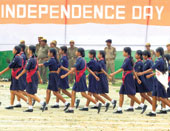 |
 |
 |
| Colours of Independence. Pictures by Eastern Projections |
India celebrated its 60th Independence Day this year. The occasion, however, held no meaning for septuagenarian author Lakhinandan Borah, who finds that GeNext is being denied the right to enjoy freedom. The day, he feels, has become a mere idea flashed on television channels.
“In proud and independent India, Guwahati, the hub of the Northeast, displays no sign of euphoria associated with 60 years of Independence. Bandhs, called by militant groups on Independence Day since yore, have taken away the zest to mark the occasion in a grand manner. It is sad that because of a few bloodthirsty people, we are being denied the right to celebrate the day in a befitting manner,” rues the Sahitya Akademi award winner.
“This is not the best of times. Bomb blasts and killings have become the order of the day. Everyday we have a bandh for one reason or the other. The city has come to a complete halt, despite being the nerve centre of the region. We are in a state of stupor, but we need to move fast. Otherwise, we will lag far behind the rest of the country.”
Borah, however, feels that despite the despondency surrounding us, the citizens did show some enthusiasm to celebrate the day this time.
“This is a positive trend. I feel more people should openly celebrate their freedom and sense of belonging to the country. People are fed up with the activities of the militant groups. They all want peace, and our freedom is all about embracing peace and brotherhood.”
This year, the city had joined the rest of the state in shunning all activities on the eve of Independence Day as a mark of respect to those killed by militants in Karbi Anglong.
“I hoist the national flag in my courtyard along with my family members every year. I want the youth of the city to celebrate the day with great gusto, too,” Borah smiles.
Taking a trip down memory lane, Borah says he and his friends at Cotton College used to participate in the institution’s flag-hoisting ceremony and in several other activities throughout the day during the early sixties. “We had a vision at that time. We wanted to be part of the nation-building process as envisaged by Jawaharlal Nehru. But such feelings are nowhere to be found today,” he says.
“India is a young country and the youth can make a lot of difference in bringing change in society,” he adds.
The author has sketched a portrait of Assamese society at a time when the country was granted freedom in his book Ganga Silonir Paakhi. Written against the rural backdrop, it portrays some events of Borah’s early life spent in his native village. The book has also been made into a film.
Borah has written 66 books so far, of which 27 are novels and 23 are anthologies of short stories. Besides, he has written two dramas, five books on popular science, three travelogues, a diary and a textbook on environment science. He has two translations to his credit, too.
The best-selling writer has several literary awards in his cap. He won the Sahitya Akademi Award in 1988 for his book Patal Bhoirobi. The Akademi translated the book into Hindi and Maithali.
He was conferred the Assam Valley Literary Award and the Ambikagiri Rai Choudhury Award, 1996, for his book Jakeri Nahi Ke Upama.
He was the president of Assam Sahitya Sabha in 1996-1997.
Borah contribution is colossal in the field of education, too. He taught in several colleges of Assam and retired as a professor and head of the department of physics and agriculture meteorology in Assam Agriculture University.
He was a visiting professor at Johannes Guttenberg University, Mainz, Germany, and the director of an Indo-German research project between 1990 and 1992.
An acclaimed climatologist, Borah’s research papers have been published in prestigious journals throughout the world.
The author is also a well-known scribe who has contributed to several national and regional newspapers.
He worked as the chairman of the Pollution Control Board of Assam from 1997 to 2003.
“Freedom has been earned at the cost of many lives. Let us not waste it because of the whims and fancies of a few bloodthirsty and selfish people,” says Borah.
The patriot signs off with the proud declaration “Jai Hind, Jai Assam”.










